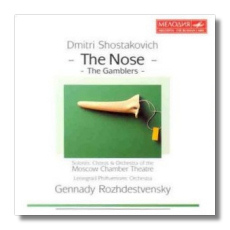
The Internet's Premier Classical Music Source
Related Links
- Shostakovich Reviews
- Latest Reviews
- More Reviews
-
By Composer
-
Collections
DVD & Blu-ray
Books
Concert Reviews
Articles/Interviews
Software
Audio
Search Amazon
Recommended Links
Site News
 CD Review
CD Review
Dmitri Shostakovich

Operas
- The Nose
- The Gamblers
Eduard Akimov, Nina Anissimova, et al.
Moscow Chamber Opera, Leningrad Philharmonic Orchestra/Gennady Rozhdestvensky
Melodiya 74321-60319-2 2CD
Another treasure from the Melodiya archives! Shostakovich's two long-neglected satiric operas are reproduced splendidly in this boxed set.
The Gamblers (written 1943, performed 1976), adapted from the 1850 story by Nicolai Gogol, is a comedy about rogues, more precisely about an enterprising man with a deck of marked cards. Thinking that he is playing against yokels in a provincial town, he hooks up with two other scoundrels. The opera abounds with clever musical devices: the scene in which the card sharks cheat each other is brilliantly timed and orchestrated – it is a parody of Handel's oratorios and Italian Baroque operas. Shostakovich presents the praise of food segment in the style of a Bach cantata. Instruments personify characters, such as the stumbling tuba that accompanies the simple servant Gavryushka and an ill-timed bass for the cheat Shvokhnev. What a pity the opera has no women characters! What a greater pity Shostakovich never finished it!
The Nose (written 1928, performed 1978), another comedy based on a Gogol story, could be the silliest satire I have ever heard. The Soviet ministers of culture need not have raved so much about Shostakovich's Lady Macbeth of Mtsensk; this inspired piece of nonsense is subversive enough. It is a perfect example of the avant-garde Russian art that flourished in the ten years following the Russian Revolution. From its opening scene, when the barber discovers that he has mistakenly cut the nose off of a customer and his magpie-like wife chides him, the opera never releases its daffy vice grip. In Act II, the police, told to prevent the nose from leaving the city, sing a ten-part chorale led by the inspector, an extended Russian folk song that will make you giggle like a child again. Even the instrumental interludes are pure cockamamie. A polka and waltz are allied to a bizarre fugue, which not only unravels but literally winds down, complete with cranking sounds. Shrill piccolos interrupt cantabile melodies, wild declarations occur next to arioso laments, and atonal episodes clash with neoclassical figures. Despite the humor in this work, Shostakovich was characteristically disingenuous about it: "Regardless of all the comical scenes, the music itself is not funny. I am aiming at true tone." Poor man. He was always looking over his shoulder.
Conductor Rozhdestvensky deftly navigates through all this wackiness. Hats off to baritone Eduard Akimov, who plays assessor Platon Kovalyov. He even blubbers rhythmically. Too bad these operas have no librettos; instead, there are barely adequate scene summaries. Play this one for your friends next time you hear them complain that Shostakovich is "too nineteeth century," "traditional," "unadventurous," or other such nonsense. You'll never see an opinion change so quickly.
Copyright © 1999, Peter Bates


















